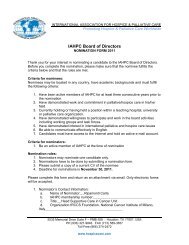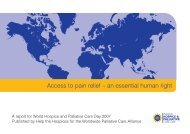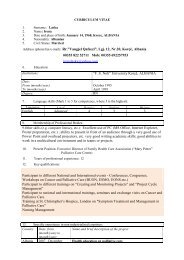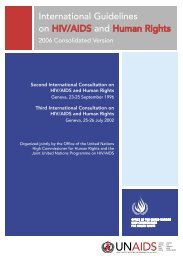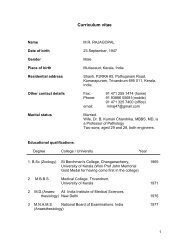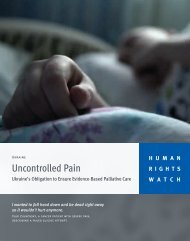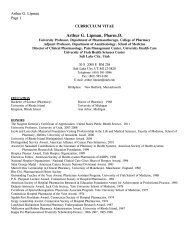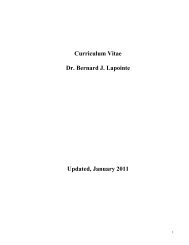INTERIGHTS Bulletin
INTERIGHTS Bulletin
INTERIGHTS Bulletin
Create successful ePaper yourself
Turn your PDF publications into a flip-book with our unique Google optimized e-Paper software.
<strong>INTERIGHTS</strong> <strong>Bulletin</strong><br />
Volume 16 Number 4 2011<br />
185<br />
Out of the Silo: Using Reproductive<br />
Rights Jurisprudence to Litigate<br />
Abuses in Healthcare Settings<br />
Elisa Slattery<br />
Women and girls seeking sexual and<br />
reproductive health services frequently<br />
experience abuse and mistreatment at<br />
the hands of healthcare personnel, who<br />
hold clear positions of authority and<br />
often exercise significant control over<br />
women in these contexts. Reproductive<br />
rights violations in healthcare settings<br />
include: verbal, physical and sexual<br />
abuse; coercive practices, such as forced<br />
sterilisation; and denial of abortion and<br />
post-abortion care services. 1 These<br />
abuses are often exacerbated when the<br />
health services they seek, such as<br />
abortion, are highly stigmatised or the<br />
women themselves belong to a<br />
marginalised group. 2<br />
Many of these issues, such as coercive<br />
sterilisation, denial of legal abortion<br />
services and failure to provide quality<br />
maternal health care have been, and<br />
are being, litigated in national,<br />
regional and international fora. 3 While<br />
this jurisprudence, especially abortion<br />
jurisprudence, is not widely drawn<br />
upon in the wider body of efforts to<br />
seek accountability for abuses in<br />
healthcare facilities, it can be extremely<br />
relevant to the litigation of healthrelated<br />
cases which are often<br />
accompanied by stigma, complex<br />
medical fact patterns and timesensitivity.<br />
Furthermore, much of this<br />
jurisprudence claims rights violations<br />
beyond the right to health, moving the<br />
discussion out of the realm of<br />
progressive realisation to immediate<br />
governmental obligations, such as<br />
preventing discrimination and torture<br />
or cruel, inhuman and degrading<br />
treatment. For example, as discussed<br />
in this article, recent jurisprudence<br />
from the Human Rights Committee<br />
and the European Court of Human<br />
Rights (the European Court) have<br />
analysed violations in the abortion<br />
context through a cruel, inhuman and<br />
degrading treatment lens.<br />
This article discusses several recent<br />
pioneering cases from regional and<br />
international human rights bodies<br />
which strengthen the human rights<br />
and accountability framework around<br />
violations in healthcare settings;<br />
establish limits on providers’ ability to<br />
place their own beliefs and biases<br />
above the well-being of their patients;<br />
and affirm the importance of timely<br />
and effective measures to both prevent<br />
and redress violations.<br />
Addressing Maternal Death as a<br />
Systemic Problem Which Violates<br />
Fundamental Human Rights,<br />
Including the Right to be Free From<br />
Discrimination<br />
In August 2011, the Convention on the<br />
Elimination of All Forms of<br />
Discrimination Against Women<br />
(CEDAW) Committee became the first<br />
international human rights body 4 to<br />
issue a decision on maternal mortality,<br />
Alyne da Silva Pimentel Teixeira v<br />
Brazil (Alyne). 5 Alyne, a young Afro-<br />
Brazilian woman, was denied timely<br />
medical care for a high-risk pregnancy,<br />
including a timely referral and transfer<br />
to a facility better equipped to handle<br />
her complications. Even when she was<br />
finally transferred to a higher level<br />
facility, she ‘was left largely unattended<br />
in a makeshift area of the hospital for<br />
21 hours until she died.’ 6 The<br />
Committee analysed the individual<br />
medical circumstances of the case as<br />
well as the broader systemic factors<br />
surrounding the provision of, and<br />
access to, quality maternal health care<br />
in both public and private health<br />
facilities in Brazil.<br />
Compounded Discrimination<br />
In assessing the interlocking factors<br />
that led to Alyne’s death – the substandard<br />
care, her family’s inability to<br />
obtain an ambulance to transfer her to<br />
the hospital and the unequal<br />
geographical distribution of higherlevel<br />
health facilities in Brazil – the<br />
Committee concluded that Alyne ‘was<br />
discriminated against, not only on the<br />
basis of her sex, but also on the basis of<br />
her status as a woman of African<br />
descent and her socio-economic<br />
background.’ 7<br />
State Responsibility for Violations in<br />
Private Healthcare Facilities<br />
The CEDAW Committee rejected the<br />
Government’s claim that it was not<br />
responsible for Alyne’s death because<br />
she had received sub-standard care in a<br />
private health facility. The Committee<br />
observed that ‘the State is directly<br />
responsible for the action of private<br />
institutions when it outsources its<br />
medical services’ and ‘always<br />
maintains the duty to regulate and<br />
monitor private health-care<br />
institutions.’ The state, it added, ‘has a<br />
due diligence obligation’ to ensure<br />
‘that the activities of private actors in<br />
regard to health policies and practices<br />
are appropriate.’ 8 This language is<br />
crucial in further articulating state<br />
responsibility for violations which<br />
occur in private healthcare facilities, 9<br />
as health care continues to be<br />
increasingly privatised, and where in<br />
many parts of the world, the sparse<br />
distribution of public facilities may<br />
mean that people only have access to<br />
private facilities. 10<br />
Individual and Systemic Remedies<br />
The CEDAW Committee’s<br />
recommendations to the Brazilian<br />
Government recognise both the harms<br />
suffered by Alyne’s family and the<br />
need for systemic change and are<br />
groundbreaking in their specificity to<br />
bring about this change. In addition to<br />
calling for reparations, including<br />
financial compensation, for Alyne’s<br />
mother and daughter (who was five<br />
when her mother died), the Committee



